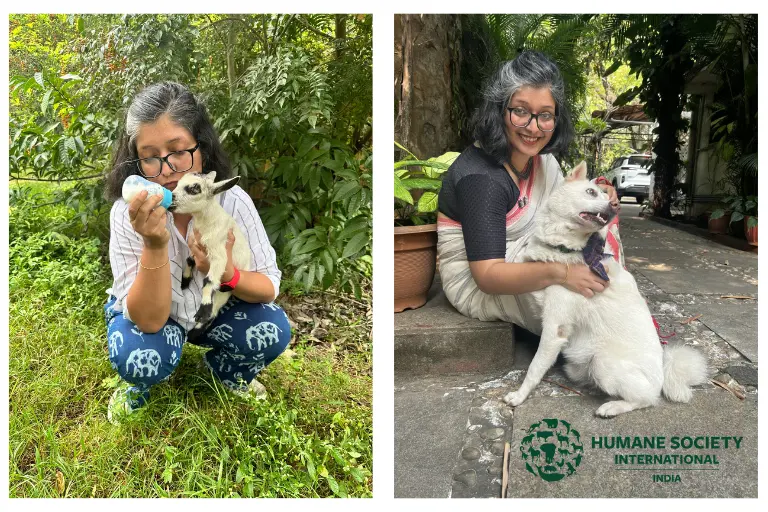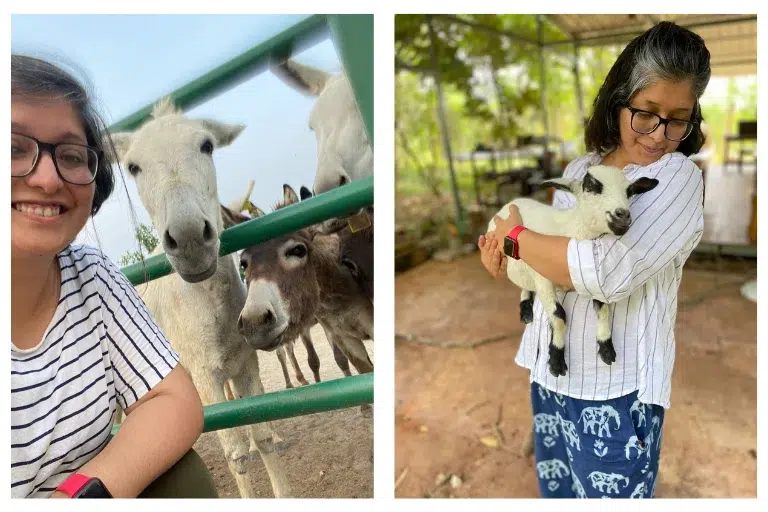
Partner Spotlight | Humane Society International/India
Alokparna Sengupta
Managing Director | Humane Society International/India
Interviewed By : Heer Shukla
Heer: How does Humane Society International/India approach animal welfare issues, and what are some key initiatives that you, as the Managing Director, have been involved in to promote the wellbeing of animals in the region?
Alokparna: At Humane Society International/India, we aim to create the largest impact on animal welfare issues to make a sustainable change for people and animals in the country. Across the board, we have used the Impact, Neglectedness and Tractability framework to identify our intervention, work on the issue and ensure effective use of resources for the same.
Farm Animal Welfare was a neglected issue when we first started working in India and we were one of the first organisations to have started work on it; this included working on intensive confinement of farmed animals.
We began working with the government to prohibit a practice called force moulting which involved starving egg -laying hens for 14 days to forcefully shed/moult their feathers. Similarly, we are one of the two organisations in the country who work on ending animal use in experimentation. We have seen immense success since the time we started and are continuing to see progress through the years by working with academia, industry and the government.
Another project we work on is the Model District which includes the identification of animal welfare challenges in different states of the country, specifically, the development of strategies to mitigate them, and the implementation of activities that promote animal welfare along with implementation of the legal and policy framework for animal protection. HSI India has pioneered the Model District Programme in Hubli – Dharwad (Karnataka) followed by Kolkata, 24 Parganas (N) and Darjeeling in West Bengal. Our work on human – wildlife coexistence includes our work on snakebite and human –elephant conflict mitigation.
HSI India also has a strong programme on disaster preparedness, response and relief. Our focus is on building systems which include preparedness, response and relief for animals during disasters, starting with Kerala and Odisha. We also work to promote human – dog co-existence by working towards reducing and ending conflict through animal birth control programmes, community engagement work, ending illegal breeding and working against the dog meat trade.
Heer: How does Humane Society International/India collaborate with government bodies, NGOs, and other stakeholders to address systemic issues affecting animal welfare? Are there specific legislative changes or partnerships that you have actively pursued to advance the organisation’s mission?
Alokparna: At HSI/India, we pride ourselves in being a big – tent organisation. We welcome everybody to work with us no matter which sector they work for as long as there is a mutual benefit i.e. for us, there is sustainable change for the betterment of animals. We approach every issue from a diverse and large perspective and work with the government and other stakeholders in a similar fashion. Everything is research and evidence backed. That is why we have been successful in having long lasting partnerships and successes. Some of them are as follows:
- Persuading the Government of India to prohibit the testing and import of animal tested cosmetics.
- Concluding the elephant exhibition at the Sonepur Mela: The largest exhibition and fair in South Asia.
- Collaborating with the Karnataka State Health Department to designate snakebite as a notifiable disease.
- Teaming up with partner organisations, like People for Animals Uttarakhand (PFA UK), to advocate for changes in pet shop, dog marketing, and animal birth control rules. Additionally, collaborating on launching and executing the #NoMore50 campaign aimed at amending the Prevention of Cruelty to Animals Act, 1960.
- Establishing the Animal Law Centre, in collaboration with the NALSAR University of Law, marking India’s first centre dedicated to animal law research and activities.
- Co-founding the Centre for Predictive Human Model Systems (CPHMS) with the Atal Incubation Centre at CCMB, Hyderabad, that serves as a think tank focused on the advancement and promotion of non-animal methodologies, contributing significantly to research and advocacy of animal welfare from diverse perspectives.
Heer: Humane Society International/India has accomplished the vaccination and sterilisation of over 153,000 dogs in Bhutan, along with the registration and microchipping of over 31,000 pets. The programme in Bhutan has reportedly achieved close to 100% sterilisation of all street dogs over 14 years. What is the envisioned plan for implementing similar impactful initiatives in India?

Alokparna: Recognising the distinctiveness of each region, we aim to customise our approach and address the specific needs and challenges prevalent there. When addressing regions like Bhutan and specific areas in India, we customise our strategies to suit the distinct terrains and geographies of each location. Specifically in India, our actions adhere to a well-defined sequence. In India, for our animal birth control initiatives, we collaborate with the State Animal Birth Control Monitoring Committees and municipalities to ensure effective coordination and adherence to regulations. Upon receiving permission to commence our work, we conduct a comprehensive dog population survey. This initial survey serves as a foundation step to plan our activities. Ideally, we aim to complete such projects within 2-3 years, unless faced with a substantial animal population, as seen in Lucknow.
After initiating the work, we conduct biannual surveys to assess and ensure the progress of our plan, with a focus on spaying, neutering, and vaccinations. In addition to our core activities, we engage intensively with local communities and animal caretakers. This collaborative effort is crucial for the long-term success of our initiatives. Our overarching ambition in India is to mitigate human-dog conflicts, reduce instances of dog bites, and minimise rabies cases. Notably, we have achieved significant milestones, such as completing 86% spaying, neutering, and vaccination in Vadodara, over 80% in Dehradun, more than 90% in Nainital, and over 70% in Lucknow. Despite our successes, challenges persist, including conflict cases and population resurgence due to uncontrolled dog breeding and abandonment. To address these challenges, we are actively working to curb dog breeding and marketing, while ensuring adopted animals are not abandoned on the streets. Our holistic approach aims to create sustainable, positive outcomes for both communities and animals in the regions we serve.
Heer: Could you elaborate on the volunteering opportunities provided by Humane Society International/India? What are the ways individuals can engage in the organisation’s efforts to support and assist animals?
Alokparna: We have an active volunteering system. If anyone is interested in volunteering with us, our first condition is that they be above 18 years of age. Then based on their interest and our requirement, we are happy to provide them volunteering opportunities, be it on the ground, social media, fundraising, research or in any other way.
